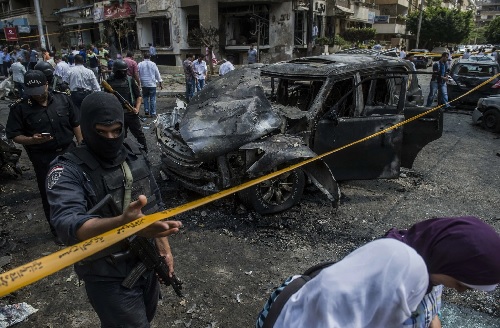
Egypt on Wednesday executed nine men suspected of belonging to the Muslim Brotherhood who had been convicted of involvement in the 2015 assassination of the country’s top prosecutor, security officials said.
The nine were found guilty of participating in a bombing that killed the prosecutor, Hisham Barakat, the first assassination of a senior official in Egypt in a quarter-century. Mr. Barakat was also the highest-ranking official assassinated since the military overthrew an elected but divisive Islamist president, Mohamed Morsi, in 2013.
The officials, who spoke on condition of anonymity because they were not authorized to brief the news media, said the families of the men had been told to pick up their bodies from a Cairo morgue.
A total of 15 people have been executed in Egypt since the start of the year. Three were hanged this month for their involvement in the 2014 killing of a judge’s son in the Nile Delta town of Mansura, north of Cairo. Another three were put to death for killing a police officer in Cairo in September 2013. Rights groups denounced the executions, saying the men were sentenced to death after being subjected to torture and beatings to extract confessions.
Amnesty International on Tuesday called on Egypt to halt the latest executions, saying that some defendants claimed that they had been forcibly abducted and that they had confessed under torture.
“There is no doubt that those involved in deadly attacks must be prosecuted and held accountable for their actions, but executing prisoners or convicting people based on confessions extracted through torture is not justice,” said Najia Bounaim, Amnesty International’s North Africa campaigns director.
Egypt’s highest appeals court upheld the death sentences in November. It commuted six other death sentences to life in prison. Death sentences were also handed down in 2017 to 13 defendants tried in absentia. They will be eligible for a new trial if they surrender or are captured. Turkey deported one of the 13 last month.
The Muslim Brotherhood was Egypt’s best-organized opposition movement for decades and won a series of elections after the Arab Spring uprising in 2011 ended President Hosni Mubarak’s nearly three-decade rule.
But Mr. Morsi, a senior Brotherhood figure elected in 2012, proved divisive, and the military removed him from power amid mass protests against his rule a year later.
Since then, the authorities have waged an extensive crackdown on Islamists, arresting and detaining thousands and leveling harsh sentences against them. The Brotherhood has been banned and declared a terrorist group.
Islamist militants have stepped up attacks since Mr. Morsi’s overthrow in 2013. An Islamic State affiliate based in the northern Sinai Peninsula has repeatedly targeted security forces and the Christian minority. Another group, known as Hasm, which has targeted security forces, has been linked to the Brotherhood.
The assassination of Mr. Barakat recalled one of Egypt’s darkest chapters, when Islamist militants and the state security apparatus engaged in retaliatory killings for nearly a decade, starting in 1990. That year, militants gunned down the speaker of Parliament, Rifaat al-Mahgoub, in Cairo, the last assassination of a senior official before the killing of Mr. Barakat.
There were attempts against other ministers until the insurgency was crushed in the late 1990s.
